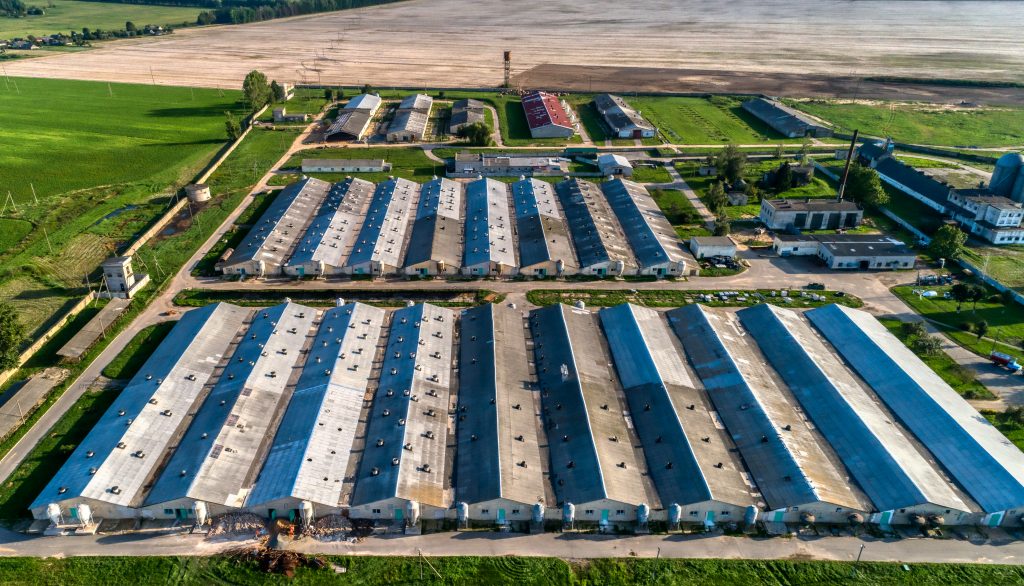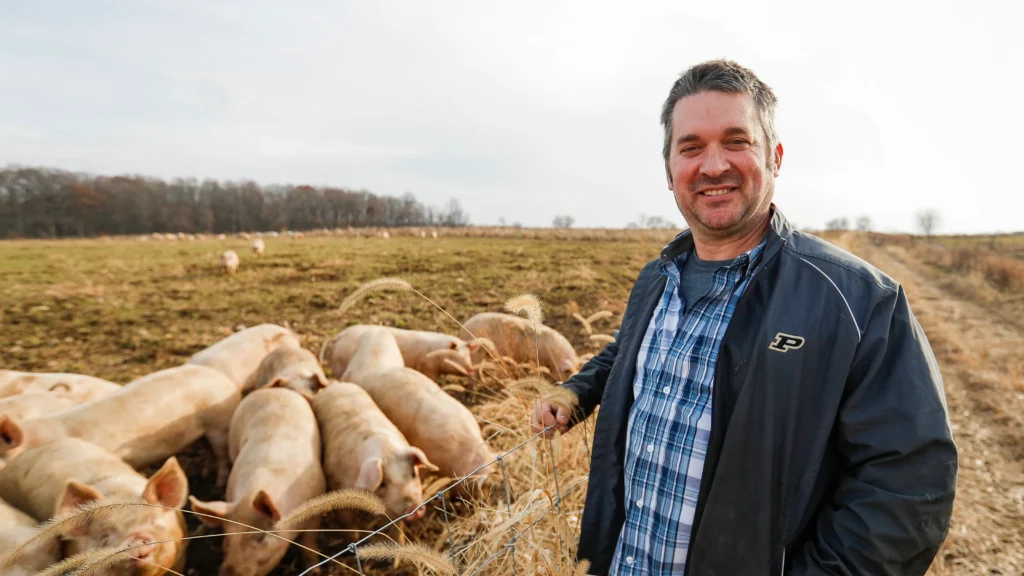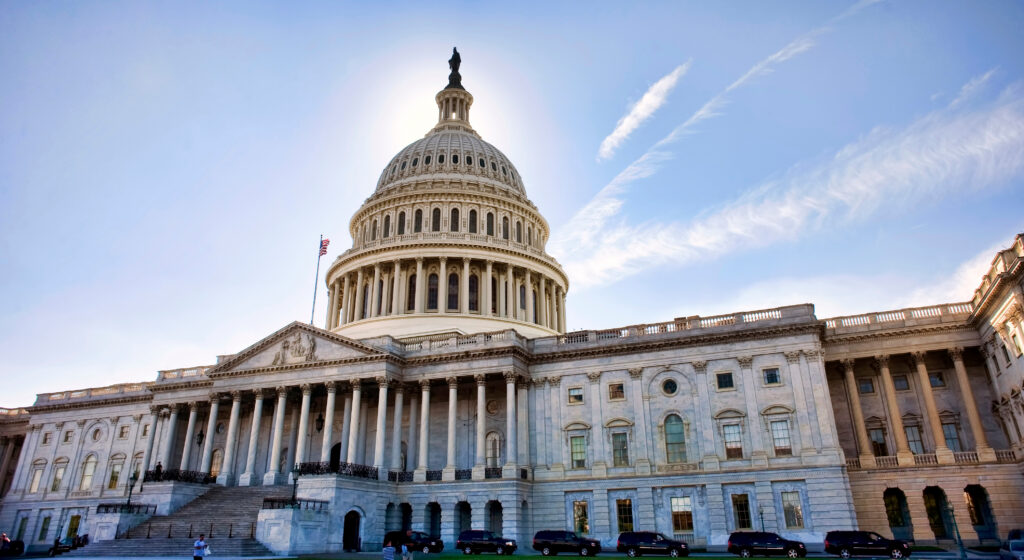Reposted from: https://prospect.org/infrastructure/building-back-america/bipartisan-group-converges-on-ag-concentration/
The insistent theme of President Biden’s public-investment package has been a more expansive view of infrastructure, not restricted to cement-laying and heavy industry.
But even as child care and even gun violence prevention have been shoehorned into the big-project bonanza, rural agriculture—a major polluter and backbone to other key sectors—has been mostly left out of the negotiations. In April, a meatier package benefiting rural America had seemed possible. Now, even loudly touted broadband coverage is reportedly being shaved down in bipartisan negotiations.
That’s a mistake, say climate and public-health advocates worried that farms are being overlooked. Beyond agriculture’s vital role in rural economies, they point to the air quality impacts of concentrated animal feeding operations (CAFOs), which make factory farms increasingly dangerous to ignore.
Pollution from farms causes 17,900 premature deaths each year, according to a study led by researchers at the University of Minnesota. The death toll is heavily spatially concentrated: The top 10 percent of polluting counties, mostly located in California, Pennsylvania, North Carolina, and along the Upper Midwest corn belt, are responsible for half of annual deaths.
Joe Maxwell, president of Family Farm Action Alliance, a coalition that fights corporate consolidation in agriculture, has pressed elected officials in recent months to keep agriculture at the table in infrastructure talks, indicating the role of farms as anchors to regional economies—and their underappreciated impact on the environment.
But Republicans and Democrats don’t see farms as tantamount to roads, bridges, or factories, Maxwell told the Prospect. At recent briefings on spending negotiations with congressional staff, Maxwell said, “When we begin to talk about infrastructure, they think about commerce and manufacturing jobs, canals and freight, but not agriculture.”
Partly, that omission is a matter of regulatory history. Factory farms aren’t as conspicuous as smokestacks or tailpipes, and are deliberately shielded from view, built in poor areas and tucked behind highways. In regulatory treatment and tax codes, agribusiness executives conveniently switch between defining themselves as farms and as industrial entities.
In a report released today, Maxwell’s group Family Farm Action Alliance shows that CAFOs not only fail to internalize the costs of their climate pollution, but they socialize the costs of their wear and tear on existing infrastructure, creating the very gap that the federal spending bill is seeking to cover.
One Colorado study cited in the report found that a 20,000-head cattle feedlot increased road repair costs by more than $6,000 per mile, as trucks hauled feed and livestock from the facility. Hog farms in Iowa annually increased road gravel expenses by $20,000 a year, according to a community estimate. As they strain regional supports, the report found, CAFOs’ tax contributions fail to keep pace with the rural road and bridge maintenance they require.
Although Maxwell’s arguments for an ag overhaul in infrastructure spending have fallen on deaf ears, outside those negotiations, Democrats and Republicans in farm states are coming together to oppose anti-competitive practices in industrial farming.
Even as lawmakers continue to treat the farm sector as hived off from the economy, they have been forced to confront how agriculture underpins key industries, amid COVID-19 meatpacking scandals, cybersecurity attacks on heavily consolidated supply chains, and other shortages with effects on consumer prices.
In response, Biden’s new executive order on economic competition proposes to champion small farms with issues like right to repair, urging the Federal Trade Commission (FTC) to make it easier for farmers or independent mechanics to fix their own tractors and combines. It also prompts the Department of Agriculture to consider stricter rules for when meat can be labeled “Product of USA.” The FTC voted unanimously to move forward on new rules requiring a right to repair last week.
The competition order marks a break with the prevailing pro-industry mood of the Obama and Trump administrations. (The saga of the Obama years was best articulated in a 2012 long-form article by current FTC chair Lina Khan.) Although farm advocates were alarmed when Biden’s rural advisers were pulled heavily from the lobbying ranks of corporate agriculture, Agriculture Secretary Tom Vilsack, a dairy industry lobbyist, hasn’t yet enacted their nightmare agenda. Instead, Andy Green, Vilsack’s adviser on antitrust and a former aide to Democratic Sen. Jeff Merkley of Oregon, has proved a better bellwether of the administration’s bullish stance toward Big Ag.
Farm-state senators Jon Tester (D-MT), Ron Wyden (D-OR), Mike Rounds (R-SD), and Chuck Grassley (R-IA) are pushing for a “special investigator for competition matters” within USDA’s Packers and Stockyards Division, in charge of rooting out unfair trade practices in meat production. That office was dismantled under Trump and folded into the Agricultural Marketing Service, a public relations outfit.
The bipartisan senators also favor new rules for the 100-year-old Packers and Stockyards Act to toughen up enforcement of unfair competition against meatpackers. The rules were delayed throughout almost the entire Obama administration, and then weakened by Trump’s USDA. But Vilsack told reporters last month that the Obama-era rules now “deserve a refresh and a re-look.”
Ranch-state Republicans argue forcefully that meat supply is a national-security issue—putting the new bipartisan consensus on anti-competitive practices beyond doubt.
“If we don’t control our own food supply, then we don’t control our own destiny,” South Dakota governor and presidential hopeful Kristi Noem wrote in a Facebook screed on monopolistic practices in agribusiness. “We need more options to ensure that America’s food can’t be held hostage by bad actors targeting foreign-based companies.”
The thoroughly bipartisan coalition and a desire for aggressiveness at USDA could lead to near-term rule changes and even legislative action. But it remains to be seen whether food’s new status as a security priority will be prioritized in the Biden agenda. The brewing fight won’t come to a head until the 2023 Farm Bill, the negotiations where ag policy is hammered out for the next half-decade.
The Family Farm Action Alliance report is geared at unsettling myths well ahead of those talks, where Big Ag talking points on renewable farming still dominate. Giants like Smithfield Foods misleadingly argue that industrial agriculture is the only way to feed a growing global population.
“We get to Washington, D.C., and spend about 18 months working out policies, reaching agreements with stakeholders, and building the science and the economics behind our policies. And we walk into the Capitol, and agribusiness has already beat us. Because they own these narratives. Everybody’s patting us on the head and saying, ‘Oh, y’all are so cute down at the farmers market, but you can’t feed the world,’” Maxwell said.
Against sentimental rhetoric about small farmers, the new report makes the case that farmworkers and citizens concerned with supply-chain safety would benefit from injecting market logic back into one of the most subsidized industries in the country.
Environmentally sustainable, profitable agriculture should not be restricted to expensive urban farmers markets, report author Emily Miller told the Prospect, but scaled to retail grocery stores. The notion that farm-to-fork is an elite indulgence, Miller said, is “itself an elitist myth.”
To counter those prevailing narratives, the report shows that “non-industrial, diversified farms that focus on food crops” could feed American households more affordably than intensive agriculture, which intensively farms soy and corn as livestock feed exported to other countries.
That will be a tough sell in D.C., where Big Ag talking points still rule, even as unlikely bedfellows look to unseat them. Still, if it’s not in the top priority for Biden’s agenda, it might get lost.




